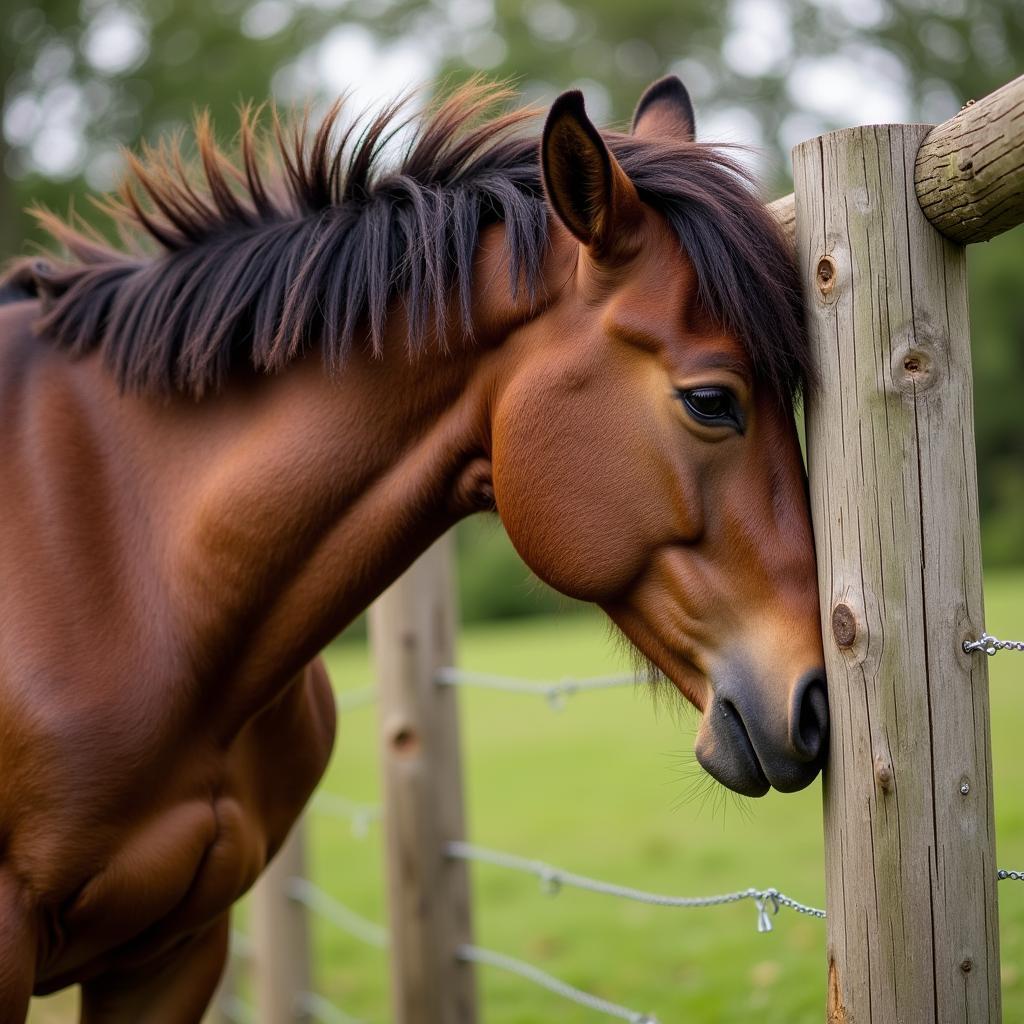Flea Control For Horses is a crucial aspect of equine health and well-being. These tiny parasites can cause significant discomfort, skin irritation, and even transmit diseases. Understanding how to effectively manage fleas on your horse is essential for responsible horse ownership. This guide will explore various methods and strategies for flea control, ensuring your equine companion stays healthy and happy.
Understanding the Flea Life Cycle and its Impact on Horses
 Horse Scratching Due to Flea Infestation
Horse Scratching Due to Flea Infestation
Before delving into flea control methods, it’s crucial to understand the flea life cycle. Fleas go through four stages: egg, larva, pupa, and adult. Knowing this cycle helps target treatment at all stages, preventing future infestations. Adult fleas thrive in warm, humid environments, making horses prime targets, especially during summer. Fleas feed on blood, causing itching, hair loss, and secondary skin infections due to excessive scratching. In some cases, they can also transmit tapeworms. For more information about other parasites, check out our guide on tick prevention for horses.
Choosing the Right Flea Control Method for Your Horse
Several flea control options are available, each with its pros and cons. Common methods include topical treatments, oral medications, and environmental control. Topical treatments are applied directly to the horse’s skin and can provide quick relief. Oral medications work systemically, killing fleas that feed on the horse’s blood. Environmental control involves managing the horse’s surroundings to minimize flea breeding grounds.
Topical Treatments: Sprays, Powders, and Spot-ons
Topical treatments are a popular choice for flea control for horses. They offer targeted application and can provide immediate relief from itching. Sprays and powders are easy to apply, but require thorough coverage. Spot-on treatments are convenient, but may not be as effective for heavy infestations.
Oral Medications: A Systemic Approach
Oral medications provide systemic flea control by targeting the fleas internally. These medications are usually administered monthly and are highly effective. However, they may not be suitable for all horses, especially those with certain medical conditions. Always consult your veterinarian before administering oral flea medications. Learn more about diseases horses can contract from ticks at our lyme disease horses symptoms page.
Environmental Control: Keeping the Surroundings Clean
Environmental control is a crucial part of any flea control program. Regular cleaning of stalls, pastures, and grooming equipment can significantly reduce flea populations. Removing manure and keeping the environment dry can discourage flea breeding. You can also find more tips on how to prevent ticks on your horse at how to keep ticks off horses.
Natural Flea Control Remedies for Horses
Some horse owners prefer natural flea control methods. These include using essential oils, such as lavender and citronella, which can repel fleas. However, it’s essential to ensure that these oils are diluted appropriately and safe for horses. Always consult with a veterinarian before using any natural remedies. More information on comprehensive tick and flea control can be found at flea and tick control for horses.
“Regular grooming is an essential part of flea control,” says Dr. Emily Carter, DVM. “It helps remove adult fleas, flea dirt, and eggs, preventing further infestation.”
Preventing Future Flea Infestations
Preventing future infestations is crucial for long-term flea control. Regular grooming, cleaning stalls and pastures, and using appropriate flea control products are essential steps. Rotating different flea control methods can also prevent resistance development in fleas.
“Don’t forget to treat other animals on your property, as they can also be a source of fleas for your horse,” adds Dr. Carter. “This will help create a flea-free environment for all your animals.”
In conclusion, flea control for horses requires a multifaceted approach. Understanding the flea life cycle, choosing the right control methods, and implementing preventative measures are crucial for keeping your horse healthy and comfortable. Remember to consult with your veterinarian for personalized advice tailored to your horse’s specific needs. Find out how to treat Potomac fever in horses at our guide on potomac fever in horses treatment.
FAQ
- What are the signs of flea infestation in horses?
- How often should I treat my horse for fleas?
- Are natural flea control remedies effective for horses?
- Can fleas transmit diseases to horses?
- What is the best way to prevent flea infestations in horses?
- Can I use dog flea products on my horse?
- What should I do if my horse has a severe flea infestation?
For further assistance, please contact us at Phone Number: 0772127271, Email: [email protected] Or visit us at: QGM2+WX2, Vị Trung, Vị Thuỷ, Hậu Giang, Việt Nam. We have a 24/7 customer service team.